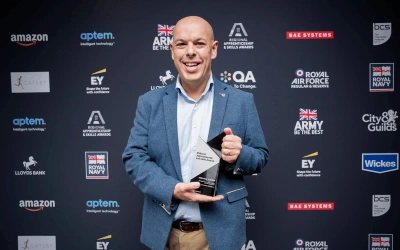I don’t think a week has gone by in my recruitment career without seeing or hearing someone exhibiting some form of stress in the office - whether that’s a loud sigh to a more dramatic barrage of bad language. Recruitment is often cited as one of the most stressful professions in which to base a career. As it’s Mental Health Awareness Week and the focus this year is on stress and the question ‘Are We Coping?’, I wanted to share my experiences from nearly a decade of recruitment in light of stark statistics from the Mental Health Foundation showing that that over the past year, almost three quarters (74%) of people have at some point felt so stressed that they felt overwhelmed or unable to cope.
Working in recruitment can seem like a rollercoaster; on a bad day the hours can be long, the environment competitive as we work to close a widening skills gap, and the mind-set difficult to switch off as it’s addictive and there’s always something to do. To give some balance, for the odd bad day there are many great days, the satisfaction in matching a perfect candidate with the perfect role, helping people and finding new solutions to problems. When interviewing, I always say that working at Lorien has changed my life – how working in our culture has brought me out of my shell, given me confidence and engaged me with people from all walks of life.
And I’m proud to be part of an organisation that cares so deeply about mental health and wellbeing. In an industry that is so fast-paced that wellbeing is sometimes overlooked, and in a world where mental health issues are often stigmatised, it’s refreshing. Lorien has a dedicated diversity and inclusion steering group (‘Cohesion’), where I volunteer alongside two colleagues to represent mental health initiatives within Lorien. At the moment we are at the start of our journey to assess and improve our employees’ wellbeing. We use a tool called Open Blend to enable us to understand our people more readily. The depth of data provided by Open Blend enables us to understand what’s important to our people and what motivates them at work. One of the things Open Blend tells us is that being able to work flexibly and spend time with family is extremely important to many of our team. An example output of this is that we work very hard to ensure people feel supported when returning to work after having children in addition to being more readily able to allow flexible working conditions where possible.
This week will see Lorien introduce it’s very first Wellbeing Survey to our team. Designed to measure current levels of wellbeing along with identifying initiatives, tools and activities that interest our people, the results of this will help us to react really quickly to what our people want in order to support their wellbeing and make us an employer that continually looks to improve and consider the mental health of our staff. The survey will be sent out annually to ensure that we are keeping on top of our teams’ wellbeing needs. On top of that, we will be communicating some practical advice to our people on how to manage stress, anxiety and where to seek help if needed.
These are examples of the small, but significant, steps we are taking to improving the quality of life at Lorien. And this is important, not just because we want to do the best for our people, but because the history that I called personal, is actually pretty universal. Mental health problems are the leading cause of sickness in the workplace and over two thirds of us experience a mental health problem at some point in our lives. When it’s this endemic, it’s important that we recognise the impact that staying silent on mental health can have. There is compelling evidence to show that a culture of silence around mental health is costly; in a recent Mind survey over 30% of staff disagreed with the statement ‘I would feel able to talk openly with my line manager if I was feeling stressed’. The minimum we can do as employers is train our people to be aware of mental wellbeing and to be compassionate. I believe we could all be doing more to talk about how we are affected and how we can help each other; for too long, mental health has been brushed under the carpet as an inconvenient reality.
At a really crude business level, ignoring mental health also has serious implications. Mental ill health costs the UK economy £35 million per year through reduced productivity, sickness absence and staff turnover. Some basic changes to how we approach wellbeing have been stated as being able to save employers 30% or more of these costs. Surely this is an investment worth making? My experience shows that taking time to improve and support mental wellbeing can result in a happier and more productive workforce – and who doesn’t want that? When it comes down to it, investing in mental health shouldn’t really be a question.
Recruitment is certainly not alone in facing the challenges of creating a happier and healthier workforce – but Lorien proves that even the most seemingly stressful environment can be tamed with the right tools, investment and attitude. It is our mission at Lorien to ensure that our team feel supported, trusted and have the balance to make the most out of their career. At the end of the day, I think that’s what we all deserve.







